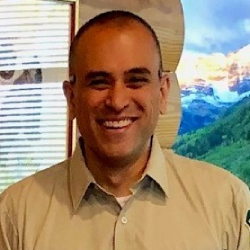2023 Candidate Arvind Bhuta

Arvind Bhuta
Natural Resources Specialist
USDA Forest Service
Candidate for: Member of the Board of Professional Certification
I received my ecological training through an undergraduate degree in Zoology and additional undergraduate degrees in Environmental Science and Geography at Auburn University. Between graduate school and undergrad, I was a biological technician on a variety of research projects and gained valuable field experience that would contribute to my graduate studies. I went on to further my ecological training through an MS in Geography and PhD in Natural Resources at Virginia Tech and a postdoctoral fellowship in Forestry at Clemson University. As an ESA member, I have had the privilege to serve on the Diversity Committee (2021 – 2023) and the Awards Nominations Committee (Present – 2025). Prior to these committees, I have been an ESA member since 2006. Outside of the ESA, I have served on committees for other nonprofit scientific and educational organizations which include the American Association of Geographers (AAG; member since 2005) and the Society of American Foresters (SAF; member since 2013). With the AAG, I have served as an AAG Diversity Ambassador (2009-2011, 2013, and 2014); the Biogeography Specialty Group Graduate Student Representative (2010-2011); AAG Career and Research Mentor (2020-2023); and Biogeography Specialty Group Board Member (2021 – 2023). I have moderated and served on multiple panel sessions associated with diversity, equity, and inclusion and career panel sessions at the Annual Meetings since 2012. With SAF, I have served as Program Chair (2021), Vice Chair (2022) and Chair (2023) of the National Capital Chapter of SAF. In the USDA Forest Service, I have served as an executive committee member (2016 – 2019) and chair (2020 – 2021) for one of the agency’s Employee Resource Group (the Asian Pacific American Employees Association) which supports Asian American, Native Hawaiian, and Pacific Islander employees in our agency.
What interests, experience or skills would you bring to this position?
Working in natural resources and as an ecologist is a passion I’ve committed to personally and professionally. Growing up as a first generation Asian American of Indian and Filipino parents in Alabama, I enjoyed getting outside and learning about the great biodiversity. This led to my academic and professional pursuits but those experiences also taught me how to navigate and build relationships as well as communicate with a wide range of people. Outside of my regular work, I make time to participate in research projects (including with the NSF currently), sit on dissertation committees, and mentor students and young professionals from a variety of backgrounds. I have had many rewarding opportunities to help people build their networks and see them pursue fulfilling career opportunities within my agency and through personal and academic networks. After graduate school, I sought professional certification from the ESA while exploring employment options. Certification helped me gain nonacademic positions, provided connections and support to aid me in the work I do, and helped me with success on programs and projects that I have managed. My exposure to what ecologists can do has helped me to form a more diverse understanding of the boundless potential of ecology.
How would you support ESA’s mission? How would you plan to promote DEIJ in ESA membership and activities if elected?
As an ecologist outside of academia, I believe that my service on the Board of Professional Certification can help to support ESA’s mission by supporting, advising, and mentoring young ecologists who decide to pursue careers in industry, the non-profit world, and public service. When it comes to promoting DEIJ in the ESA, I am a first-generation Asian American with two different Asian heritages (Indian and Filipino) and understand why inclusion, diversity, and representation matters and is important in our field and as to who we are as professionals. I could provide perspective when considering a more inclusive certification process, would look to providing better accessibility for certification to those from underrepresented groups, and would hope to build a more diversified group of certified ecologists in the process. I would further advocate for the importance of certification and its relevancy for all ecologists, especially those working outside of academia. I would also seek to work with other ecologists of color, race, or ethnicity; immigration status; gender and/or sexual orientation; and ability to reach out to and work with communities to recruit the next generation of ecologists.